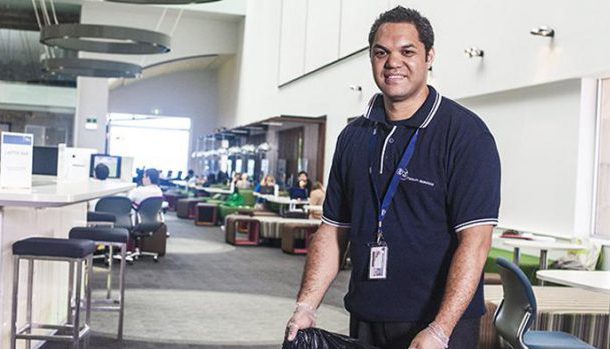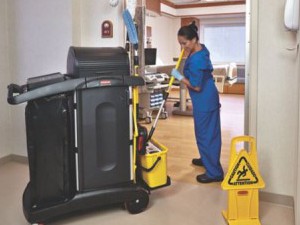
Tender writing is a competitive and challenging business. Customer expectations continue to shift as the need for innovation, personalisation and transparency increases.
Cleaning operators need to ensure they are compliant with legislative requirements, such as the newly introduced Modern Slavery Act, and are up to date on the latest trends, products and processes.
So how can you ensure your submission isn’t only compliant, but also addresses all customer requirements thoroughly and persuasively? Here are some tips from industry experts that can help make writing a tender a little less stressful.
Answer the question
It may sound simple enough, but in most of the tender submissions that come across the desk of FM Contract Solutions CEO Brian Clark, the contractor has not answered the questions properly.
“Whatever you do, you must answer the questions correctly, clearly and succinctly so the person reading the submission knows exactly what you mean, and they can see you understand what the customer wants,” says Clark.
Questions in tenders are designed to ensure cleaning firms comply with procurement requirements, and many otherwise strong submissions are disqualified or marked down simply because they didn’t answer the questions or provide enough information.
Clark recommends operators respond using bullet points. As he explains “It’s obvious when contractors have added 500 words of waffle to their answer when they could have answered it in three or four succinct sentences. Keep it brief and clear. That’s key.”
Focus on the customer
Another common mistake is telling the customer what they need instead of what they want. Customers have already identified the need for a product and service in the tender. It is up to the cleaning operator to convince the customer they are the right provider and have the solution they need.
“Answer questions in relation to that tender,” explains Clark. “Articulate how you are going to solve the customer’s problem. Most contractors fail to demonstrate how they are going to use their resources to achieve what the customer wants.”
According to Property NSW, cleaning operators must always ensure questions are fully answered, and that all stated requirements have been met and are included in the response submission.
“It is critical for cleaning operators to review the stated evaluation criteria and ensure their response addresses all these requirements, including their capacity to deliver quality services, achieve better value for money and relevant experience, ” a spokesperson said.
Establish a point of difference
One of the best ways to stand out is to establish a point of difference, says Clark. However, it must relate to the customer.
“I once read a council tender for a single-storey building and the contractor had listed a new escalator cleaner as their innovative point of difference. There’s no point including innovative products and services that have nothing to do with the tender.
“Many companies see this as an opportunity to tell the customer how good they are and what they have achieved at other sites but fail to offer technology that is relevant to the customer or establish a real point of difference from competitors.”
Instead, cleaning operators should focus on offering relevant services and outline how it will benefit the customer and provide value for money.
“Tenders are not about price, but your customer needs to understand the value for money that you offer with your proposition and how that will benefit them if your company is awarded the tender.
“You can show innovation through ideas, methodologies and processes that will streamline the cleaning process and improve the standard of cleaning overall. Innovation doesn’t have to be a new product. But it must be something the customer can see will provide them with an advantage or improve their outcomes.”
Provide value-added initiatives
Australian Green Clean general manager Charlie Aykroyd says it’s not just about ticking boxes, but showing you are different.
In its recently renewed contract with the University of South Australia, Australian Green Clean restructured its onsite cleaning processes which Aykroyd said was pivotal to retaining the university contract, as well as providing extra full-time work to team members.
“We continued to encourage daytime cleaning so university staff can build relationships with our cleaners. We also restructured how staff will carry out core cleaning duties by splitting that into study periods and ‘out-of-study’ periods so we could introduce a periodical cleaning team to increase efficiencies and improve outcomes.”
The University of South Australia also plans to introduce an environmental committee made up of students and staff members and managed by Australian Green Clean to introduce more sustainable options and initiatives at the university; an initiative suggested by Australian Green Clean.
“We understand a lot of these extra initiatives aren’t something people will necessarily want to pay for at the beginning of a contract. But providing those value-added initiatives shows you are different.”
Ask questions
No matter how many questions you have, just ask, urges Clark. Just make sure questions are asked through the correct channels. Asking the customer or stakeholders outside the official tender channels can lead to disqualification.
“You won’t look stupid. It’s the stupid people who don’t ask questions. Ask questions that are clear and succinct and don’t be afraid to ask for clarification if the answer is not clear.”
Cleaning operators also shouldn’t be afraid to point out errors or to question specifications that may not comply with legislation or standards.
Procurement is about avoiding and minimising risk for the customer and sometimes customers make mistakes or miss vital considerations in the specifications, says Clark.
“Companies that draw attention to errors that may expose the customer to risk show their expertise and enhance their credibility.”
General manager of Vintage Cleaning, Joanna Hudson says cleaning operators need to clearly understand the client’s requirement.
“Always clarify any issues or grey areas before submitting a tender and have these changes documented,” she said. “Read the contract documents carefully and clarify any concerns or conflicting clauses. Reflect this in the specification and contract agreement and always include the process for contract variation, increases and payment.
Hudson also recommends maintaining up to date policies and certifications, as well as in house documents on a company’s profile and business practices.
Do your research
Before writing a tender Aykroyd advises to conduct internal and external research.
As she explains: “We research who will be reading the tender before writing so we know what the individual’s drivers are as well as the company’s. For example, if it’s a facility manager reading the tender, they may be more inclined to look at the cost of the tender, whereas if it’s a sustainability officer, they will obviously be looking at any sustainability initiatives submitted by the cleaning operator.”
Aykroyd suggests cleaning operators also consider the quality of the contracts they apply for. “Sometimes it’s not about the number of contracts you have; it’s the quality of those contracts. Companies can be very different. For example, some companies don’t want to see the cleaners, and some want to be able to talk to the cleaners. For us, our cleaners aren’t just a number and some of them want to be interactive with clients.
“A lot of people forget in tenders that you actually should sit back and consider whether the client is a right fit for your company. Do their values and cultures align with your own? If you investigate the company and the person evaluating the tender, you’ll often find your answer.”
Sustainability and social responsibility
According to Aykroyd, there has been a shift in the last few years in tenders, with companies looking for cleaning operators that engage in and offer sustainable and environmentally friendly solutions.
“For a long time, sustainability was an off the cuff type of question included at the end of a tender. But now it seems companies are wanting to go down the sustainable road.
“It doesn’t mean a cleaning operator will win a contract just because they are sustainable. But sustainability is something that’s becoming more of the status quo. Tenders are now asking how a cleaning operator is giving back to the environment or being more socially responsible.”
The introduction of Australia’s first Modern Slavery Act has also impacted the process.
VDG Services business development executive John Eriani says state and local government agencies now include modern slavery requirements in their tender documents.
“While the questions may vary, [tenders] generally request evidence of compliance to the Modern Slavery Act 2018, with businesses now needing to include confirmation that as a minimum, internal staff and subcontractors are fairly treated with payment of award wages and good working conditions,” he said.
Hudson says more emphasis is being placed on companies to show their social initiatives in large tenders, and while her business has not yet been exposed to the Modern Slavery legislation, she sees its introduction as a positive step.
“Cleaning contracts [in Queensland] are lower in price compared to 10 years ago which has resulted in many contractors quoting lower prices to stay in business. This decline has opened the door to sham contracting and the abuse of cleaning staff who are now asked to cover increased areas of work in less time.
“There is huge pressure placed on cleaning contractors to comply with all legislation requirements (paying correct wages, engaging staff on proper award classifications, paying on superannuation and other entitlements etc.) while the contracts prices are expected to reduce.
“This is not possible and has only encouraged companies to introduce poor practices that ultimately result in cleaners working harder and insurance claims increasing.”
ISO accreditation
Most tenders ask for ISO accreditation or equivalent, with more government and corporate tenders placing greater emphasis on cleaning operators to demonstrate social and sustainable initiatives.
Having accreditation can go a long way in the tendering process, but for those companies who don’t yet have formal certification but can substantiate with evidence that your company is working towards this accreditation, you may get past this hurdle.
“Sometimes being honest and straightforward and providing evidence that you’re working towards achieving a certain goal is the best way to go,” says Clark.
Offer value beyond price
“When someone asks for a price, everyone puts in the cheapest fee. But if you can demonstrate the risk of buying on price to the customer that can help win the contract.”
Clark recommends providing customers with an open plan costing template that shows the minimum cost to clean, how wages are paid and how the contractor meets the Modern Cleaning Award and how remaining costs are allocated.
According to Property NSW as part of the procurement process, proponents are expected to outline their plans for achieving value-for-money in the delivery of cleaning services and present ideas for improvements in quality and innovation to add value to the delivery of cleaning services, while also maintaining current protections and entitlements for permanent employees.
Operators also need to be realistic about whether their company has capacity to take on certain opportunities; particularly large-scale or high-value works.
“Consider the required net tangible assets and working capital, which may be assessed by the tender evaluation committee.”
Hudson recommends also including your company’s track record in the tender.
“Including information like references; site visits of the contracts you currently have in place; whether your company is fully environmentally and safety certified; if you’re audited regularly and verification of correct and on time payments to suppliers and workers can all help add value to a tender.”
Dealing with an unsuccessful bid
Statistics provided by FM Contact Solutions suggest more than half of submissions are non-compliant and up to 60 per cent of compliant tenders are discarded in the first round of evaluation. Cleaning operators unsuccessful with their tender are urged to follow up and seek feedback.
“Ask the customer what you did wrong and where you failed because they will tell you,” says Clark.
“Ask why your tender didn’t make it through. Most of the time, it’s not because of the price, it’s simply because of the quality of the responses to the questions.”
Hudson says Vintage Cleaning always seeks post tender feedback.
“It’s beneficial to know what areas we could have scored higher in. We document the feedback so improvements can be made to our quality system.”
This article first appeared in the July/August issue of INCLEAN magazine.
Comment below to have your say on this story.
If you have a news story or tip-off, get in touch at info@3.106.117.80.
Sign up to INCLEAN’s newsletter.





Great article but you have neglected the #1 KPI – client relations
All points you’ve made – all be it through 3rd party opinions – are relevant, Tenders are never ever a race to the bottom- outcomes & solutions = a sustainable service provider.
We are in the relationship business not Tendering or being a 3rd party provider!